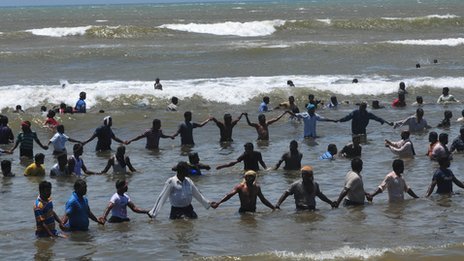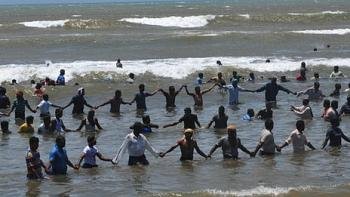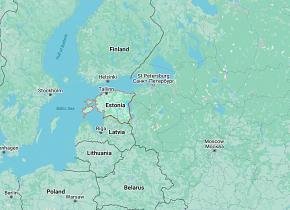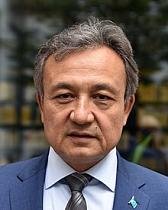India's Judiciary creates scam over Kudankulam
There is no reason why the judiciary, the conscience of the nation, should willingly play pro-regime roles by opposing people’s and humanity concerns.
Paranoia about nuclear energy isn’t new. Most nations have shown a similar paranoia when it comes to nuclear energy following the disaster in Fukushima. Over 100 activists from these sites came together for the first time ever at a public hearing in Delhi on August 22 - just as national support for the five-year-long campaign against the Jaitapur plant snowballed. The National Committee in Solidarity with the Jaitapur Struggle - comprising leaders like Prakash Karat, AB Bardhan, Sitaram Yechury and Ram Vilas Paswan, independent experts and intellectuals - trenchantly criticised the project, based on French company Areva's troubled European Pressurised Reactors (EPRs).
The grounds of protest against the 9,800 MW plant in Maharashtra are somewhat similar to those being echoed in Tamil Nadu. The protestors argue that the plant will damage local ecology, their consent for the plant wasn’t sought and also speak of the obvious fear of how a potential accident at the plant could affect them. While the issue is currently not in the headlines anymore, the agitators in the Ratnagiri district of Maharashtra are no doubt closely following the developments in Kudankulam.
After plant reopening gimmicks, Japan now talks of reducing its dependence on nuclear power altogether by the 2030s. Germany has also begun decommissioning old plants and also speaks of weaning itself off it altogether by the 2020s. The US despite promoting nuclear energy in India, is caught at a crossroads when it comes to developing its own nuclear power program. In Japan a major loss of confidence in nuclear energy came after it was discovered that the nuclear safety regulators had allowed the plant to function despite problems being evident earlier.
After the Fakushima disaster, almost every country that uses nuclear energy declared that it would change its policy. Every country, except India! The India government has colluded with Union Carbide (now Dow Chemicals) to ensure that the victims of the Bhopal Gas Leak will never get justice. But no amount of compensation can ever be a solution for nuclear disasters.
Regime-Judiciary Nexus
When the Madras High court refused to stay the deadly fuelling operation in the nuclear terror plant, the people of Kudankulam and the humanity at large, besieged by nuclear terror operations of state, still had hopes of getting justice from Supreme court but when apex court also sided with the state terror operators and delivered an interim judgment in favour of state nuclear terror intent against the people, humanity has become shaky, felt betrayed yet again, losing trust in the judicial ability in justice delivery. As suggested by the regime and nuclear mafias, the courts have protected the transnational nuclear mafias.
Declining to put on hold for now the loading of fuel rods in one of the two reactors of Kundankulam nuclear power plant in Tamil Nadu, the Supreme Court Thursday Sep 13 said it would hear Sep 20 the plea seeking to restrain the central government.
The apex court's decision came as hundreds of people from Tamilnadu's Idinthakarai village, the epicentre of the protests against the Kudankulam Nuclear Power Plant (KNPP), stood in the sea water Thursday to protest moves to load uranium fuel in one of the two reactors.
Justice K. S. Radhakrishnan and Justice Dipak Misra declined to pass any immediate order on a petition seeking to restrain the government from going ahead with the loading of nuclear fuel rods in the reactor of the plant. The court said it would hear Sep 20 the plea seeking to restrain the central government from doing so.
Judiciary mischief is perhaps the worst kind of menace and brute evil. Madras High court seems have created the basis for the Supreme court to promote state nuclear terror agenda. Supreme Court has just said the regime must ensure security and safety of the people and the regime knows it has to just file another affidavit stating that people are safe. In other words, the judiciary has clearly offered the regime and nuclear mafias to ensure safety of the people by killing them so that they need not to live until the nuclear plant blasts.
The nuclear terror project was cleared in haste in violation of the recommendations of an official Task Force, and without even the fig leaf of an Environmental Impact Assessment (EIA) report. The NPCIL has refused to furnish to the public the site evaluation and safety analysis reports, although so directed by the Central Information Commission.
In the name of nation and national interests they protect the rich and multinationals and want the common people also support that. Recent disclosures from a special official safety review on all Russian reactor designs reveal their several generic flaws, including inadequate emergency cooling, poor evacuation procedures, and non-factoring of earthquake hazards. The Kudankulam reactors lack an independent freshwater source, critical to cooling them in emergencies. They are probably the world's only nuclear reactors dependent on unreliable seawater desalination, which can fail and has no backup. The Atomic Energy Regulatory Board (AERB) approved the fuel-loading despite all this and without the mandatory emergency evacuation drill in a 16-km radius. AERB approval is NPCIL's clinching justification for fuel-loading. The AERB "has no rule-making powers." It never fulfilled the mandate to prepare an overall nuclear and radiation safety policy.
It has failed to develop as many as 27 of the 168 Standards, Codes and Guides it itself termed essential. It has no role in radiological surveillance and monitoring workers' health. It doesn't directly oversee on-site emergency drills. The AERB doesn't even possess a full inventory of nuclear materials and radiation sources. It has no framework for decommissioning nuclear plants.
The major demands of protesters included release of those arrested for agitating against nuclear power, compensation for those injured and whose articles went missing during police action, stopping fuel loading in the plant and no action against 'peaceful' protesters.
When the Regime Targets People.......
The Indian regime, committed to the welfare of the people is interested only in promoting the nuclear and other arms merchants and is threatening the people with impending nuclear disasters.
One has no idea as to how many more nukes India wants and for what, because it has already plenty of weapons of mass destruction at various sites. Madras High court and Supreme court seem not worried about the deadly risks involved in the state nuke manufacturing agenda. Both High CA private company's employee moved the Supreme Court against a Madras High Court order giving the green signal to the commissioning of the Kudankulam nuclear power plant in Tamil Nadu.
People of Kudankulam moved the Supreme Court. Indian regime seems to have exerted pressure to expedite the case so that uranium terror operations can continue. In fact it was not known when the petition would come up before the apex court. But the regime among other interested parties pushed for an early verdict so that the process of continued of fuelling of the nuclear reactor with deadly poisonous uranium quickly manufacturing nukes?
IT professional P. Sundarrajan moved the apex court contending that the government should not go ahead with the loading of the fuel rods till 17 safety steps recommended by the expert committee are implemented. Petitioner G. Sundarrajan, working with an IT company, claimed that the Madras high court paved the way for starting the plant without ensuring that critical safety features were in place. He challenged the Aug 31 verdict of the high court and sought an ex-parte interim order restraining the government from going ahead with the initial fuel loading of Unit I and 2 of the Kundankulam Nuclear Power Project (KNPP) in Tirunelveli district.
The petition said the Government had also absolved the Russian supplier of the nuclear reactor from any liability in case of an accident. And Russia has already stated that it not responsible for any nuclear blasts.
Besides the central government, the petitioner made the Atomic Energy Regulatory Board, Nuclear Power Corporation of India, the power plant director and the Tamil Nadu Pollution Control Board as respondents.
Mentioning the matter before the bench, counsel for the petitioner Prashant Bhushan, a prominent member of Anna team, spearheading anti-corruption campaign, told the court that the expert committee was set up after Fukushima nuclear power plant accident in Japan, to suggest safety steps to ward off any such incident. Bhushan told the court that out of 17 safety steps recommended by the expert committee only six have been put in place and to implement the remaining 11, the Nuclear Power Corporation of India (NPCIL) will require six months to two years. The petitioner had said that the recommendations of the government's own expert task force on the critical safety features had not been implemented so far.
The petitioner said that the recommendations of the government's own expert task force on the critical safety features had not been implemented so far. "The recommendations are extremely critical to the safety of the plant and it could not be allowed to run even for a day without adequate safety and backup features in place," the petition said.
The task forces' recommendations, amongst several others, concerning alternative fresh water storage system and emergency pumping equipment, were yet to be implemented even. And state claims it is supreme to decide everything against people’s safety.
People's Movement Against Nuclear Energy (PMANE), which is spearheading the stir, said the agitators have put forward four demands - stoppage of the process of fuel-loading in KNPP, giving up of the plan to arrest anti-nuclear movement leaders, adequate compensation for those who suffered losses and release of those already taken into custody. In other words, the people use the simple villager language to tell the terrocratic regime to quickly dismantle the nuclear assets from their soil so that they can live without nuclear terror fear.
If this govt can’t handle garbage, how will it handle nuclear waste?
Popular Sufferings and Regime Frustration
If this govt can’t handle garbage, how will it handle nuclear waste? The Manmohan-Jayalalitha terror combines seem to derive too much of sadistic pleasure at the pains and sufferings of common masses in and around Kudankulam, India Tamilnadu..
The Manmohan-Joyalalitha regime has not yet realized that it’s pointless to try and silence the masses by state terror techniques. The state frustration in not being able to impose nuclearism on people has led to repression, including lethal firing, unleashed on peaceful protesters against the Kudankulam nuclear plant , on top of FIRs over many months charging thousands with sedition. People are terrorized by the state which makes two things clear. Nuclear projects in India can only be thrust on unwilling citizens at gunpoint.
Extreme arrogance of Indian state terrocracy is in full display in Kudankulam. Erection of human chains in the Sea by the Jalsatyagraha shows, people will resist them tenaciously, because they are aware of their hazards. That's true of every nuclear project, whether Jaitapur (Maharashtra), Gorakhpur (Haryana), Mithi-Virdi (Gujarat), Kovvada (Andhra Pradesh), Haripur (West Bengal), Chutka (Madhya Pradesh) or Banswada (Rajasthan). For instance, at Gorakhpur, there has been a daily dharna against four proposed reactors for two years, unbeknownst to Delhi, which lies in their potential radiation-fallout zone. Manmohan regime has decided that multiple reactors will be erected at Jaitapur, aggravating hazards, as in Fukushima.’
At the people's hearing, activists vented their apprehensions about the safety hazards of nuclear power, heightened by the catastrophe at Fukushima and the poor safety record of India's Department of Atomic Energy (DAE) and Nuclear Power Corporation of India (NPCIL). They exchanged their experience of the nuclear establishment's non-transparent and authoritarian ways, its refusal to share information of vital importance to public safety, and police vindictiveness. They also discussed how to develop common strategies. The NPCIL has no plans for long-term storage of nuclear wastes.
People hate both nuclear terror plants and their supporters. Taking their protest against the Kudankulam power plant to the sea route, hundreds of people today stood in the waters forming a human chain to demand halting of preparations for fuel loading into the reactor.
With black flags fluttering in the backdrop, the protesters said they were prepared to sacrifice their lives to protect their livelihood and ecology through the 'jal satyagraha Taking their protest against the Kudankulam power plant to the sea route, hundreds of people today stood in the waters forming a human chain to demand halting of preparations for fuel loading into the reactor.
Over 100 activists from these sites came together for the first time ever at a public hearing in Delhi on August 22 - just as national support for the five-year-long campaign against the Jaitapur plant snowballed. The National Committee in Solidarity with the Jaitapur Struggle - comprising leaders like Prakash Karat, AB Bardhan, Sitaram Yechury and Ram Vilas Paswan, independent experts and intellectuals - trenchantly criticised the project, based on French company Areva's troubled European Pressurised Reactors (EPRs).
Indian police continue to terrorize the masses by their dirty terror techniques of searches for PMANE activists.
State Brutality
For development of rich poor people must sacrifice their lives. So, the government has also brutally cracked down on the local community's peaceful protest against the plant and slapped sedition cases on them.
Anti-people Indo-Tamilnadu duo jointly killed already 2 innocent fishermen, Antony and Christ Sahayam. While Antory was murdered on land, Sahayam was forced to jump on to rock, killing himself. A 38-year-old man has been hospitalised with head injuries after he fell down in panic while a Coast Guard aircraft flew low along the coast near Idinthakarai in one of its sorties. Taking their protest against the Kudankulam power plant to the sea route, hundreds of people today stood in the waters forming a human chain to demand halting of preparations for fuel loading into the reactor.
The Coast Guard aircraft hovered over the sea and its ships kept a vigil off nearby Idinthakarai as the villagers, including women and children, from Kudankulam and nearby fishing hamlets walked into the sea for the show of strength.
Villagers are complaining that police are coming into their homes and conducting searches, pulling their belongings and smashing window panes. One villager said that the window panes in at least 25 houses have been destroyed and that two people were arrested in police efforts to terrorise them.
Anti-corruption activist Arvind Kejriwal met PMANE convenor SP Udaykumar who was whisked away by villagers in an effort to stop him from surrendering to police. Udayakumar had turned up at Idinthakarai and announced he would surrender at 9pm in the presence of a “prominent non-political national leader.â€
IAC activist Arvind Kejriwal who travelled to Kudankulam to express support for the people’s agitation against the nuclear power plant has slammed what he has called ‘terror tactics’ by Jayalalithaa and the Tamil Nadu police. â€Police came and broke idols in the church in Idinthakarai and also urinated on the stage. They destroyed motorcycles and boats: What law gives them the right to destroy property? These are terror tactics by Jayalalithaa – how can she do this to the people who voted for her?â€, he said, in a media address at the Idinthakarai village which has been the site of a sustained anti-nuclear protest.
The activists' testimonies and expert opinions clearly oppose deadly nuclearism efforts of an arrogant India regime.
Nuclear Notes
Clearly what is being done in Kudankulam in name of development is a state crime and the top criminals responsible for the ghastly murders should be brought to justice. On the one hand Indian regime does what USA, UK and Russia ask it do, and on the other, it makes all out efforts to help the domestic multinationals and other big business to thrive at the cost of others. On the one hand, India secures the profitable business of multinational corporations to use the huge profits they make in India to be shifted to their own countries by allowing FDI in all sectors, on the other, the poor, deprived, weaker sections are made to suffer more; the regime, claiming to be a great democratic setup, terrorizes the common people with price rises, state terrorism and nuclear terror threats.
The shameless attack on and murder of two fishermen by Indian paid police in deep conspiracy testifies Indian state terror intent. Entire humanity stands in complete solidarity with the villagers of Idinthakarai who are resisting the forceful fuel loading of the Kudankulam nuclear reactor. Among those who expressed complete solidarity with the people of Kudankulam village fighting against imposition of nuclear plant Tamil leader Vaiko, Kerala Communist leader and ex-CM Achu, Arunthathi Roy, and Anna Hazare team members like Prashanth and Kejriwal. A lot of humanist leaders and activists across the globe also support them.
Indian regime is eager to push a nuclear button like cowards with no nobility, wipe out entire peoples with nuclear bombs, just because their neighbouring rulers don't agree with their policies and do not promote their global interests.
Not only the mere safety measures are hoax but even the nuclear terror project itself is a serious, deadly threat to people. Judiciary must ask the regime to terminate the nuclear terror path and adopt alternative better ways of electricity generation. The agitation has ruined the lives of most of the local people. Police have driven out many from their villages. Immediate compensations for property loses and human loses must be paid and the people should be allowed to resume their daily life as before - fearlessly.
India has already amassed huge piles of deadly weapons of mass destructions. How many more nukes does India require and for what?
People and the nation have to saved from imminent nuclear disasters and nuclear wars. Judiciary has a positive role to play. It could ask the reigm eto shut down the Kudankulam nuclear terror project forth with.
Supreme court is expected to protect the masses, encourage the terrocratic regime to end the nuclear arms race in the name of electricity generation and ask it to seriously promote the cause of total disarmament and regional-global peace!. .
Dr. Abdul Kalam, former president of India whom the regime hired to dissuade the people from the anti-nuke movement has now declared that only non-nuclear world is safe.
The Congress led UPA government is stand discredited by its anti-people polices. Regional leaders like Tamil state CM Joyalalitha have shown that they care damn about people and they, emboldened by the mandate by the people, now want to protect the rich and multinational interests even by killing common people who elected them.
The UPA regime is discredited from all ankles. Popular anger, discontentment and frustration could dent its chances, drastically dent its vote bank when it goes to poll next. Coalition might become too tough too!
Regime has become the enemy of the people. Popular good will cannot be earned by state terror mechanism and machination.
Comments
There are 0 comments on this post














